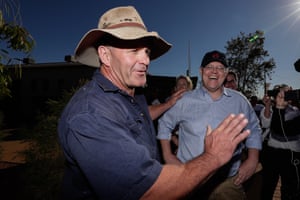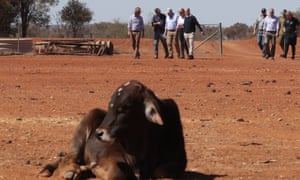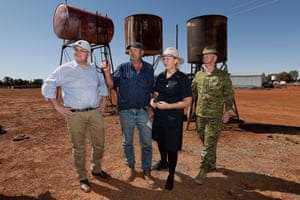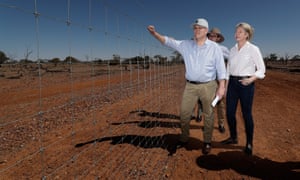Extract from The Guardian
Ex-president of the National Farmers’ Federation says politicians have failed ‘to do grunt work’ needed by members
The former president of the National Farmers’ Federation, Brent
Finlay, has accused politicians of “jumping in front of the cameras”
while shirking effective policy work on drought and climate change.
As Scott Morrison and his special drought envoy, Barnaby Joyce, toured south-west Queensland on Tuesday, Finlay described the former deputy prime minister and agriculture minister as the last in a long line of ministers who had “no real appetite” for national drought policy in a changing climate.
“Climate change and connectivity are the two biggest issues facing the bush. Climate change is real and we have to have a national drought policy framed on what we know about climate change – the two are interlinked,” Finlay told Guardian Australia.
“Instead of jumping in front of the cameras when a drought is on, we need them to do the grunt work on effective financial measures that allow our farmers to build up cash reserves in the good times to draw upon when the dry comes again.”

As Scott Morrison and his special drought envoy, Barnaby Joyce, toured south-west Queensland on Tuesday, Finlay described the former deputy prime minister and agriculture minister as the last in a long line of ministers who had “no real appetite” for national drought policy in a changing climate.
“Climate change and connectivity are the two biggest issues facing the bush. Climate change is real and we have to have a national drought policy framed on what we know about climate change – the two are interlinked,” Finlay told Guardian Australia.
“Instead of jumping in front of the cameras when a drought is on, we need them to do the grunt work on effective financial measures that allow our farmers to build up cash reserves in the good times to draw upon when the dry comes again.”

He also called on governments to start rewarding good farmers who prepare for drought rather than the “less efficient” farmers.
Finlay said politics had caused a failure of a national drought policy which should apply some structure to how farmers cope in drought and the nature of government assistance.
“I went to Labor and the Coalition in 2013 when nowhere in Australia was in drought,” Finlay said. “The Labor government had dropped the exceptional circumstances funding program and I made the comment, this is gone now, what is the national drought policy?
“Labor said they would do a policy before the 2013 election. [Former Coalition agriculture shadow spokesman] John Cobb said there would be something on drought. When Barnaby was appointed, he said it will be in the agriculture white paper. It was not there.

Building a national drought policy “always seemed too hard”, he said.
Finlay would like to see drought treated as a new category in natural disaster arrangements to embed a structural mechanism beyond the politics of the day. Dry spells could then be monitored using data from the CSIRO and the Bureau of Meteorology and when the outlook turned towards drought, conditional government assistance that rewarded good managers would kick in.
“Farmers acknowledge drought is a regular part of agriculture and with climate change we will potentially see more and more and that’s what we need,” he said.
“The climate is changing, you can see it in the eyes of farmers who dismissed it as rubbish eight years ago. By recognising climate change, it is empowering resources to support agriculture.”
He would like to see a permanent drought commissioner placed in the prime minister’s office to be proactive on policy development and climate monitoring. This would be a significant move, as it would place the commissioner out of the hands of the agriculture minister, who is a National party minister in any Coalition government.

“The permanent drought commissioner needs to be in PMO, we need to keep it at arms length from those politicians that feel they are directly effected. If it’s in PMO and hopefully its bipartisan, it elevates the management of the position.”
Finlay was president of the National Farmers Federation for three years from 2013, coinciding with the last months of the Gillard-Rudd Labor government and Barnaby Joyce’s first three years as agriculture minister. He was also chair of the NFF’s national drought committee.
Finlay said the government should put all ideas on the table to change the thinking on drought policy towards a model that rewarded good farm managers.
“It’s not going to make me popular to say it but unfortunately current drought assistance measures reward our less efficient farming operators at the expense of those families who’ve been better prepared for drought.
“You’ve only got to look at our current weather patterns to know that climate change is real and we should expect more extreme weather including more droughts in the future.”
Guardian Australia has contacted Barnaby Joyce’s office for comment.

No comments:
Post a Comment